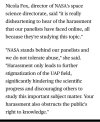Of course it's conceivable, it's a common and compelling argument. But it's far from certain. The truth is we just don't know one way or another based on our current body of knowledge.
Think of it in terms of the 'anthropic principle'. I look at this thought experiment.
Imagine that there is a universe, and within that universe the mechanisms are such that intelligent life is exceedingly rare. That amongst the billions of planets and trillions of stars, that the sequence of events needed for life to evolve and become of human-like intelligence is just so infinitesimal and so unlikely that there is only one intelligent civilisation on average every 10-20 billion years. For the sake of argument, imagine that all I just said is true.
In this scenario, that intelligent civilisation would be making all the same rationalisations and reasonings that we are in this thread. They'd be saying, "well look at how big everything is". The ability to enquire about the likeliness of your own existence epistemoligically requires you to exist to make that enquiry. Because otherwise you wouldn't exist to ask the question in the first place. In this hypothetical scenario, they are the 'lucky ones' who got to exist, but they have no way of knowing that. They don't realise they've won a galactic lottery, they assume they must just be one of millions of others. It feels to them much more likely - but the fact is, in this scenario, they are wrong.
In other words the fact of our existence alone says nothing about the likeliness of existence itself. We could be 1 of 100,000,000,000 or we could be 1 of 1. You can't extrapolate trends with a sample size of one.
There is nothing about this universe that is designed to be easy for humans to understand and we are not good at dealing with the very big or the very small. We see the vastness of the universe and we think, surely, the probabilities are in favour of life. But the probability of intelligent life occuring could easily be just as small as the universe is big. Or... it could be just sufficiently small for us to never know one way or the other.
We just don't know.



